Contents
Vegetarian in Thailand: What To Know Before You Go
Sure, the language barrier can make it difficult to ascertain what you are ordering, a problem for vegetarians (and anyone with allergies or intolerances!).
But with the advent of the technological age most bars, cafes, and restaurants have WiFi which means a quick Google translation can luckily clear up most questions.
When traveling, and especially if you have a diet requirement, some simple research beforehand can go a long way. Buying a translation book is often an indispensable tool, and a hard copy book can always be relied on – unlike your phone.
Looking up words or catchphrases, such as vegan or vegetarian, in the local language can save time and make things easier when checking if a restaurant can serve you.
Learning how to say the words or phrases also is good practice, and is usually appreciated by the locals. In Thai, ‘vegetarian’ is ‘gin jay’.
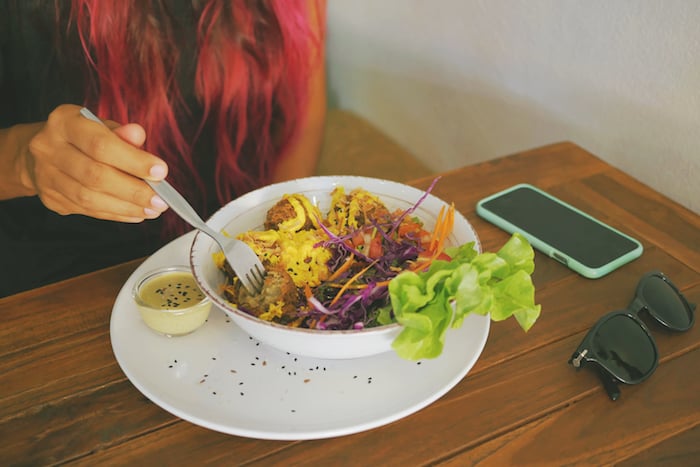
How To Find Vegetarian Food in Thailand
Southeast Asia is a region known for its love of meat, with sweet and sour chicken, pork dumplings and roasted fish found across many menus.
Street Food
In Thailand street-food is considered a delicacy and a must-do, but most will have meat or egg in it. Unfortunately the majority of Thai food from local vendors will not be suitable for vegetarians.
But street food is not completely off-limits! Check with your hostel in Thailand or with companies which offer street food tours as there may be a vegetarian option and locals will know where to go to find veggie delights.
Vegetarian Restaurants
Thailand may be a nation of meat-eaters, but tofu is also gaining popularity across the country. You can often find it on menus or ask for meat to be replaced with it. A dish I ate a lot which was easily available was rice with tofu and vegetables.
Many towns are picking up on vegetarianism and veganism, so check before you travel as you will often find a bespoke restaurant nearby. Even if it does not cater exclusively for veggies, the majority of eateries in towns will often have a vegetarian section, which can be easily adapted for vegans.
Vegetarian restaurants will usually have the greatest variety of choices with the best meat-alternatives, and it saves having to double check with the staff as you already know you can eat everything they serve.
Sacred Sites
One interesting tip I picked up is to look for vegetarian eats around temples and monasteries. Thai Buddhist monks practice veganism, so you’ll usually find a good selection of vegetarian food in Thailand clustered around these spots.
Indian Restaurants
Another tip for traveling vegetarians is to look out for Indian restaurants which will often have vegetarian options. As most of the south of the country does not eat meat, most Indian eateries will have a great vegetarian section or be entirely meat-free.
While not traditional Thai cuisine it can provide a welcome change from tofu and rice.
Seafood Markets
A pescatarian will have much more choice as with a bustling fishing industry seafood is popular along the coast, particularly in towns such as Phuket, Patong, Pattaya and many of islands.
Restaurants will often have a display of fresh or alive fish, crabs and lobsters outside to entice hungry patrons in.
Eating seafood, curries, and soups may cost the same as vegetarian food but if you select a bespoke fish or crustacean dish the prices will reflect that.
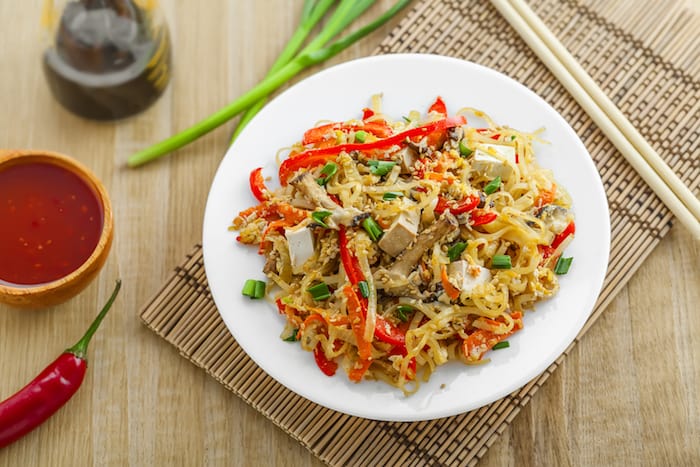
How To Make Thai Food Vegetarian
Thailand is renowned for its cuisine, and its most famous dishes are recognized around the world. Being vegetarian doesn’t mean you have to miss out on sampling them. Here’s how you can make some of the classic Thai dishes vegetarian…
Green Curry
Green Curry can be made with just vegetables and tofu, as can similar dishes like Red Curry and Massaman Curry. Just ask for no meat / vegetable only.
Tom Yum
Tom yum, which normally comes in soup form but can also be used to flavour other dishes, can be enjoyed as a hearty meat-free soup.
Pad Thai
This Thai favourite lends itself well to vegetarians, as it can be ordered with no meat (tofu only). Vegans can simply ask for the dish with no egg. I found that even when I asked for ‘no meat’, there was no price difference between the versions with meat or the veg only ones.
Salads
Thailand has a great range of salads and as they are usually made fresh the meat can easily be left out. Papaya salad, green mango salad and banana blossom salad are just three delicious choices which can easily be made meat-free.
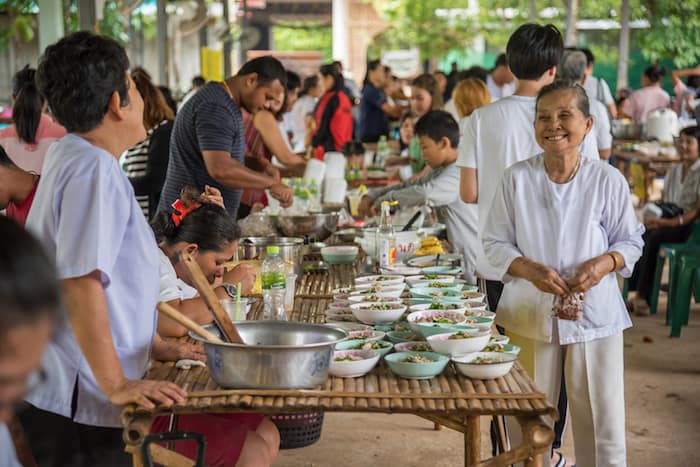
The Risks of Vegetarian Food in Thailand
I did my best to be careful and double-check my orders with staff, but I still ran into a lot of ‘grey areas’ while trying to eat vegetarian in Thailand. The biggest example of this is fish sauce. This is a staple in Thai cuisine, and finds its way into all kinds of dishes.
Staff may not realize adding this makes a dish not vegetarian or vegan – depending on your preferences.
All ingredients are not always listed, so you may find yourself inadvertently eating fish sauce. There’s no way around this unless you stick to only eating western food.’
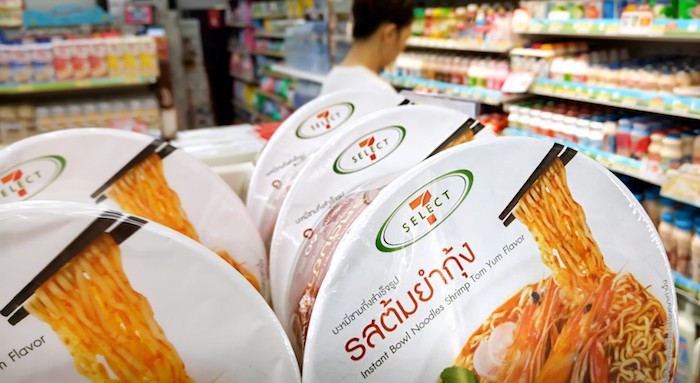
The Surprising Hack for Being Vegetarian in Thailand
One unlikely place which offered vegetarian options with a good selection was local supermarkets. 7/11 and Family Mart dominate street corners in southern Thailand and sell fresh, frozen, canned, and vegetarian ready meals.
An abundance of veggie delights can be found here, although usually in can or packet form so the freshness is sacrificed.
Vegetarian taro rice, green curry, mushroom soup, and some dubious-sounding options including gluten ball curry and glutinous five spice curry were all welcome additions I found on the super market shelves while traveling.
While they can be eaten cold, they are enjoyed best when heated up so double check you have access to a microwave. For those on a budget these are great options to try and they keep costs down.
As with other Asian countries, noodles are an affordable and popular option. They’re offered at virtually every shop restaurant and street vendor.
These are a great go-to when traveling as they come in lots of vegetarian flavours, and if you buy them from a local supermarket they have a hot water station so you can make and eat them there and then, perfect for on-the-go travelers.
If you find a bigger supermarket noodles are sold in packs so you can save money by buying in bulk, and if your hostel has a kitchen where you can prepare them then this can be a great money-saving option.
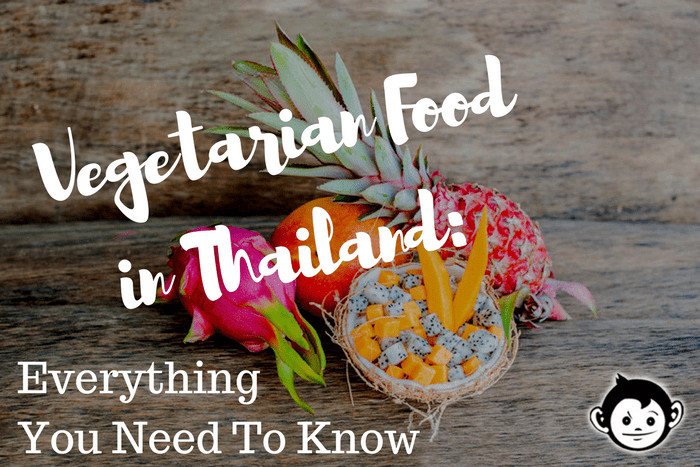
Eating in Thailand as a vegetarian varied greatly, and there is an option which will cater for every budget. Shop-bought noodles can cost as little as 15THB, while a meal at a classy vegetarian-only restaurant can set you back as much as 2,000THB.
Safe travels and happy eating!
More Info on Vegetarian Food in Thailand
Looking for more great info on how to eat vegetarian while you’re backpacking in Thailand? Check out some of our recommended reads:
- How To Eat Vegetarian in Thailand by Selene Nelson for Food Republic
- How To Travel as a Vegetarian in Thailand by Angela Dollar for Wanderlust and Lipstick
- Looking for Vegetarian Food in Bangkok? by Vedika Anand for Make My Trip



